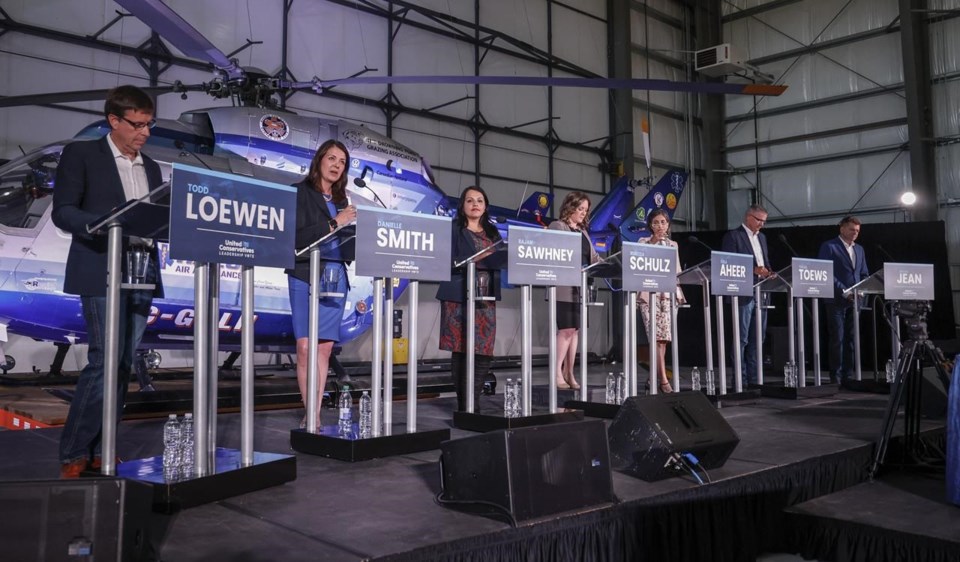EDMONTON — Seven candidates scrambled Friday to sign up last-minute memberships in Alberta’s United Conservative Party leadership race while political observers say that without hard data on which contender has a leg up, follow the feet.
Danielle Smith, who started out with a handful of supporters in the United Conservative caucus and cabinet, has seen more in-house support in recent days, including some who had initially pledged to back rival Travis Toews.
“Sometimes when you see people starting to shift allegiances, it sort of gives you a sense of where the momentum is going,” political scientist Lori Williams, with Mount Royal University, said Friday in an interview.
“It’s those people who want to be in cabinet or in a position where they can work with whoever the new premier is. They think things are moving in that direction and they’re moving with them.”
Labour Minister Kaycee Madu was the latest convert, announcing his support for Smith at rally in Edmonton on Thursday.
Earlier Thursday, former cabinet minister Devin Dreeshen said he would support Smith. Earlier in the week, Service Alberta Minister Nate Glubish switched his support from Toews to Smith.
Before that, Toews supporter Pat Rehn switched his support to Smith, joining fellow backbenchers Devinder Toor, Peter Guthrie and Nathan Neudorf.
Toews, who quit as finance minister to run in the contest, still has the lion’s share of support, with about two dozen cabinet and caucus members openly in his camp.
Political scientist Duane Bratt said even so, by any metric from crowd sizes to polling to the fact Smith is the focus of attacks by her opponents, she is clearly the one to beat as party members being voting next month, with results to be announced Oct. 6.
“She’s drawing the biggest crowds, we’ve got (MLA) endorsements that are now coming her way because they see her as the front-runner," said Bratt, also with Mount Royal University.
“All the other candidates are responding to her in some fashion (and) some are adopting the same policies.
“I wonder after midnight, (when membership sales end) if there is some soul searching among the other candidates and whether they drop out or not.”
The party says hand-delivered-memberships were due by 5 p.m. Friday, with the cutoff for online memberships by midnight. These are to be the only memberships allowed to vote in the race.
Final count totals on memberships aren’t expected from the party for about two weeks.
Smith, a former Wildrose party leader, grabbed headlines out of the starting gate in the contest with her proposed Alberta sovereignty act. The act, as pitched by Smith, would seek to give Alberta the right to ignore federal laws and court rulings deemed not in its interest.
Legal scholars and most of the other candidates in the race have labelled it an outrageously inflammatory, bizarre and illegal scheme that would create a domino effect of economic and investment uncertainty bordering on chaos.
But Bratt noted the other two main contenders have excoriated Smith’s plan while adopting versions of it.
Toews has promised his government would seek to levy tariffs on goods and services or imports from specific regions to counter rules and policies deemed unfair to Alberta. Brian Jean has pledged to affirm that the Alberta Bill of Rights is paramount over Section 1 of the Constitution.
“It’s an attempt by the sovereignty act by a different name,” Bratt said.
Candidates Rajan Sawhney and Rebecca Schulz have been equally critical of Smith’s sovereignty act, but have in recent days adopted more combative policies when it comes to federal relations.
Schulz has promised a protecting provincial rights summit within two months of winning, while Sawhney is pledging to pursue go-it-alone initiatives such as a provincial pension plan and police force.
Both Bratt and Williams said Smith has done a better job capturing and harnessing latent anger within the party’s base when it comes to Prime Minister Justin Trudeau and the federal government
And they note Alberta’s 4.5 million people could, come Oct. 6, be propelled in a new direction dictated by 40,000 or so UCP voters.
“To me, it looks like it’s only the really animated, diehard, engaged and largely angry folks that are driving the narrative right now,” said Williams.
“They’re angry and they want to see change not just provincially but federally, and they want someone who is going to fight.”
This report by The Canadian Press was first published Aug. 12, 2022.
Dean Bennett, The Canadian Press



